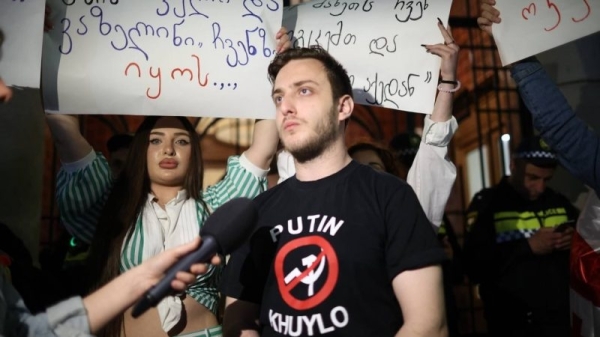Russia makes eyes at Georgia, prompts contradictory reactions in Tbilisi

Russia restored visa-free travel for citizens of Georgia on Wednesday (10 May) and lifted a ban on direct flights between the two countries imposed in 2019. Georgia’s government welcomed the move, but the country’s President denounced it as a “provocation”, while angry citizens staged protests in Tbilisi.
In a statement, Russia’s Transport Ministry said Russian airlines would operate seven flights weekly between Moscow and Tbilisi. It said Russia wanted “to facilitate the conditions for communication and contacts”.
The move represents a sharp warming in relations between Moscow and Tbilisi, which have been among the most strained in the former Soviet Union, but which have improved in recent years as Georgia’s ruling party avoided offending Moscow.
Moscow and Tbilisi have had no formal diplomatic relations since 2008, when Russia occupied South Ossetia and Abkhazia, almost 20% of the country’s territory, after a short war ended thanks to EU mediation.
The Georgian government welcomed the move. Georgian foreign minister Ilia Darchiashvili welcomed Russia’s decision, saying it “will simplify the daily living conditions of our citizens, and it will give them the chance to communicate and travel freely and easily.”
Russia allows citizens of most former Soviet republics visa-free access but imposed a visa regime on Georgians in 2000, citing the risk of terrorism. Moscow banned direct flights to Georgia in 2019, after anti-Russian protests.
Georgia allows Russians visa-free access and full work rights for up to a year, which has made the country one of the main destinations for Russians who have left their country since the Ukraine war started.
‘Provocation’
Georgian President Salome Zourabichvili, whose position is largely ceremonial and who has repeatedly accused the ruling Georgian Dream party of having ties to Moscow since being elected with its backing in 2018, delivered a speech calling Russia’s move “a provocation”.
“We do not need gifts from Russia, masked as some kind of a concession”, Zourabishvili said, explaining that “more governmental control is needed over those Russians who enter and stay in the country”. She warned that “starting some kind of relationship with Russia” would lead to accusations that Georgia is helping Russia circumvent the sanctions against Russia and ultimately would make it more difficult for the country to obtain EU candidate status.
Hundreds of Georgians went on the streets of Tbilisi to protest against the rapprochement with Russia.
A protest was held in Tbilisi against Putin’s resumption of flights from Moscow to Tbilisi and back, as well as against the lifting of the visa regime for Georgian citizens.
Source: SOTA pic.twitter.com/mmSNr6NntJ
— Belsat in English (@Belsat_Eng) May 11, 2023
Georgian society remains strongly anti-Russian, with hundreds of thousands of Georgians living as internal refugees after fleeing South Ossetia and another Russian-backed secessionist region, Abkhazia.
Tbilisi though has avoided taking an overtly anti-Russian stance since the start of the Ukraine war last year and declined to impose sanctions on Russia.
Georgia’s stance has earned praise from Moscow but strained relations with the European Union, which many Georgians would like their country to join.
In March, amid large street protests, Georgia’s government abandoned efforts to pass a draft law regulating so-called “foreign agents”. Critics said the bill was modelled on a Russian law they say was used to undermine civil society there.

Georgian ruling party withdraws ‘foreign agents’ bill after protests
Georgia’s ruling party said on Thursday (9 March) it was dropping a bill on “foreign agents” after two nights of violent protests against it amid criticism the draft was inspired by a Russian law and represented an authoritarian shift.
Read more with EURACTIV




